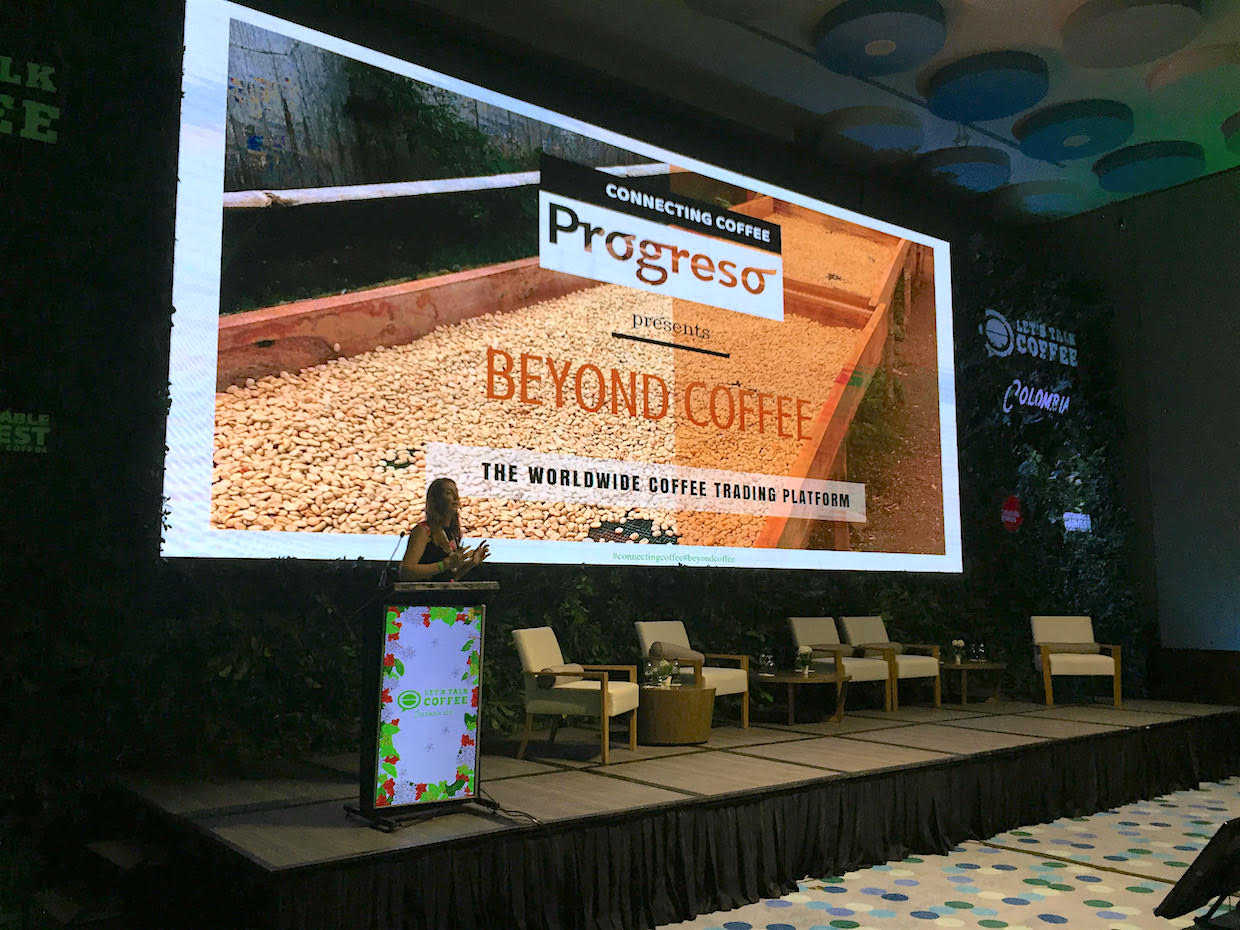
Progreso Foundation Managing Director Isabel van Bemmelen unveiling the new Beyco coffee trading platform at Let’s Talk Coffee in Cartagena, Colombia. Daily Coffee News photo by Nick Brown. The launch was one of our top NGO-related news stories of 2018.
In a strongly worded letter to the coffee industry at large this past summer, coffee leaders in Colombia and Brazil made a remarkably interesting suggestion regarding the responsibilities of nonprofit organizations:
The programs that some multinational companies do to promote sustainability are offset by their business practices. Likewise, international non-profit organizations that promote coffee cultivation must take responsibility for absorbing the resulting production surpluses.
If nothing else, this sentiment underscores the political and social complexities inherent to the nonprofit sector. It also led to one of our favorite tweets of 2018, from Specialty Coffee Association Chief Sustainability Officer Kim Elena Ionescu:
NGOs also might not exist if businesses were accountable for the social and environmental costs of their operations.
— Kim Elena Ionescu (@kimelenaionescu) August 28, 2018
Corporations exist to make money. In that sense, their organizational ethos is transparent; it’s a shallow pool. Navigating the politics and money trails in the nonprofit sector remains a more complex challenge, even if, at their core, NGOs exist to fill in the social, environmental or economic gaps created by industry.
This is by no means an exhaustive list of the big news affecting nonprofits and other NGOs in and around the coffee sector this year. It is, however, intended to highlight efforts in 2018 that have been primarily led by nonprofits based on their own individual approaches to sustainable development, professional development or restoration.
Ric Rhinehart Stepping Down as SCA Executive Director, Leading Price Response Initiative
A member email from the coffee industry’s largest trade organization said that its longtime executive director, Ric Rhinehart, is stepping down and will be replaced by SCA Deputy CEO Yannis Apostolopoulos. The SCA also announced that it is launching an initiative to address coffee prices in the green coffee trade. The group said its Coffee Price Crisis Response Initiative is “aimed at understanding and addressing the price crisis affecting coffee farmers and threatening our supply chain as a whole.”
La Marzocco Giving $750,000 to the UC Davis Coffee Center
Espresso machine manufacturer La Marzocco has pledged $750,000 to the new UC Davis Coffee Center. With this latest injection from the private sector, the Center’s 6,000-square-foot primary building will now include a “La Marzocco Brewing and Espresso Laboratory” stocked with La Marzocco machines.
World Coffee Producers Forum to Become a Nonprofit Organization
Following a hugely successful inaugural event last July in Medellín, Colombia, that brought together some 1,500 attendees from 41 countries, the World Coffee Producers Forum is expanding to become a nonprofit organization. It has also announced the launch of a second forum to come in July of 2019 in a yet-to-be-determined location.
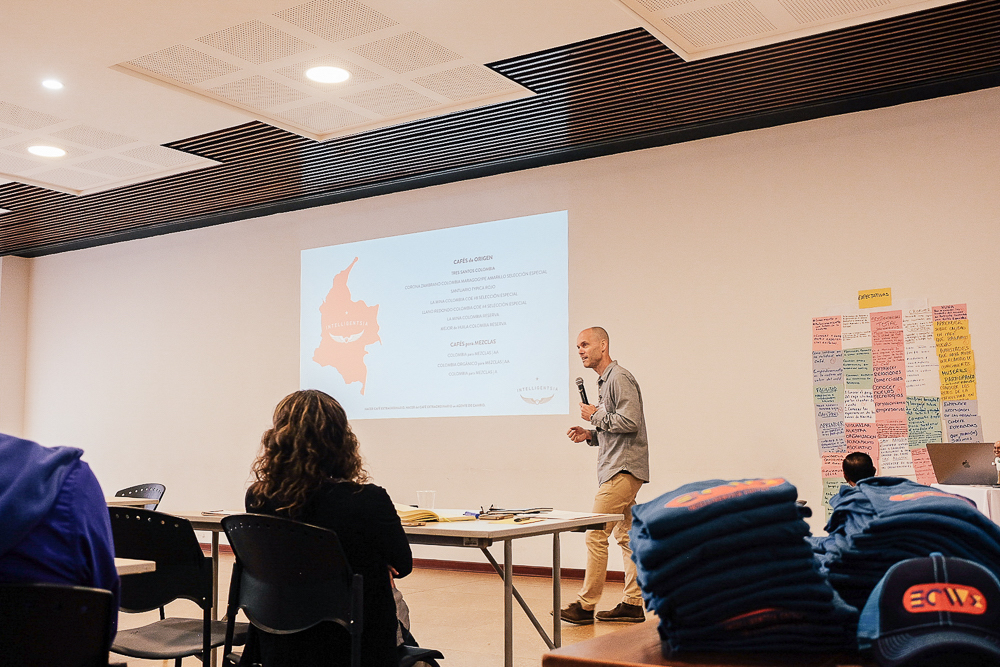
Intelligentsia Coffee Director of Sourcing and Shared Value Michael Sheridan leading a seminar at the ECWx event in Nariño, Colombia. Photo courtesy of Intelligentsia Coffee.
Intelligentsia and Root Capital Promote Competitiveness Through Quality at ECWx in Colombia
The first ECW-style event outside Intelligentsia’s own sourcing network, ECWx was part of Root Capital’s Feed the Future Partnership for Sustainable Coffee, funded by USAID and Keurig Dr Pepper. It should be noted that Keurig and Intelligentsia are both brands under the JAB Holding Company coffee umbrella.
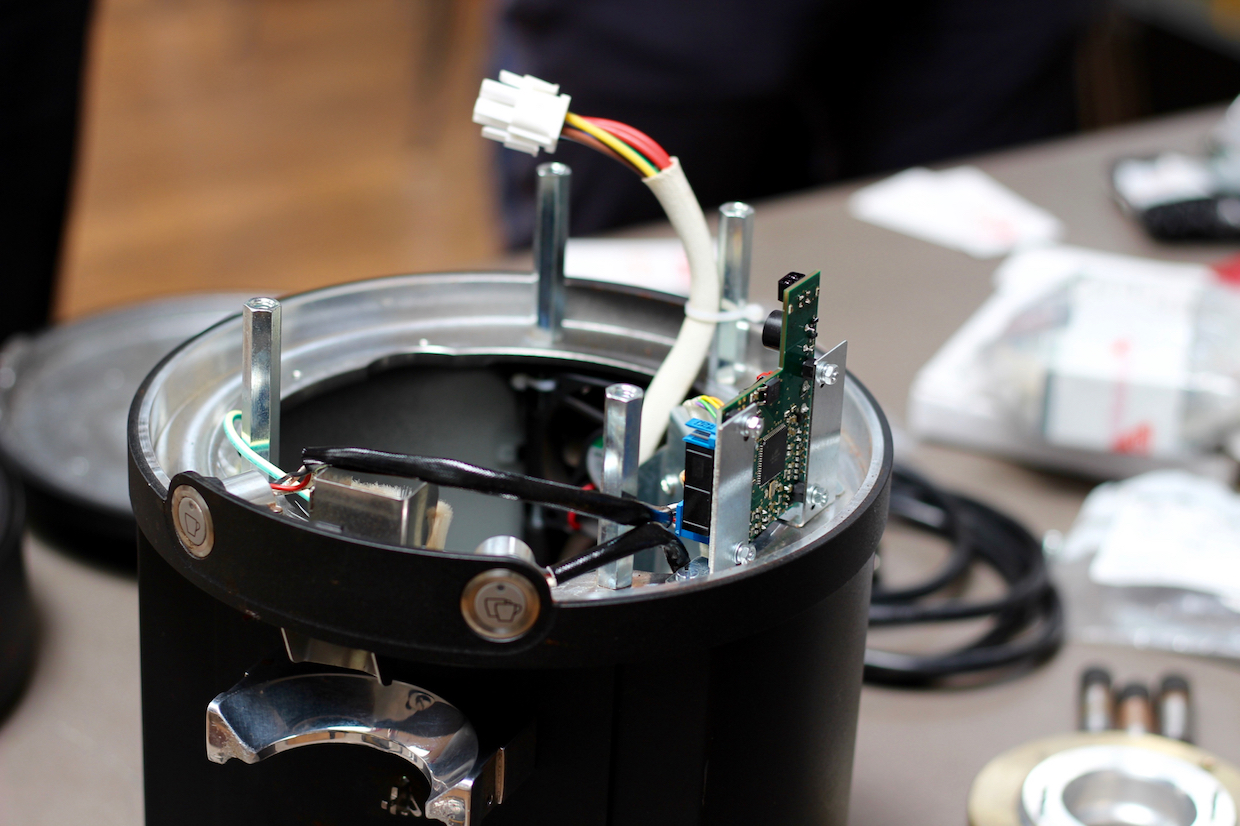
Disassembled Peak grinder at the recent CTG Summit in Los Angeles. Daily Coffee News photo / Lily Kubota.
Exploring the Inner Workings of the Coffee Technicians Guild
“Here’s your job: Try to learn how to do it as fast as you possibly can, and don’t hurt yourself,” Baiz said of typical tech training experiences. “This is oftentimes how people get going. Then they struggle through it, and use tech support as training platforms.”
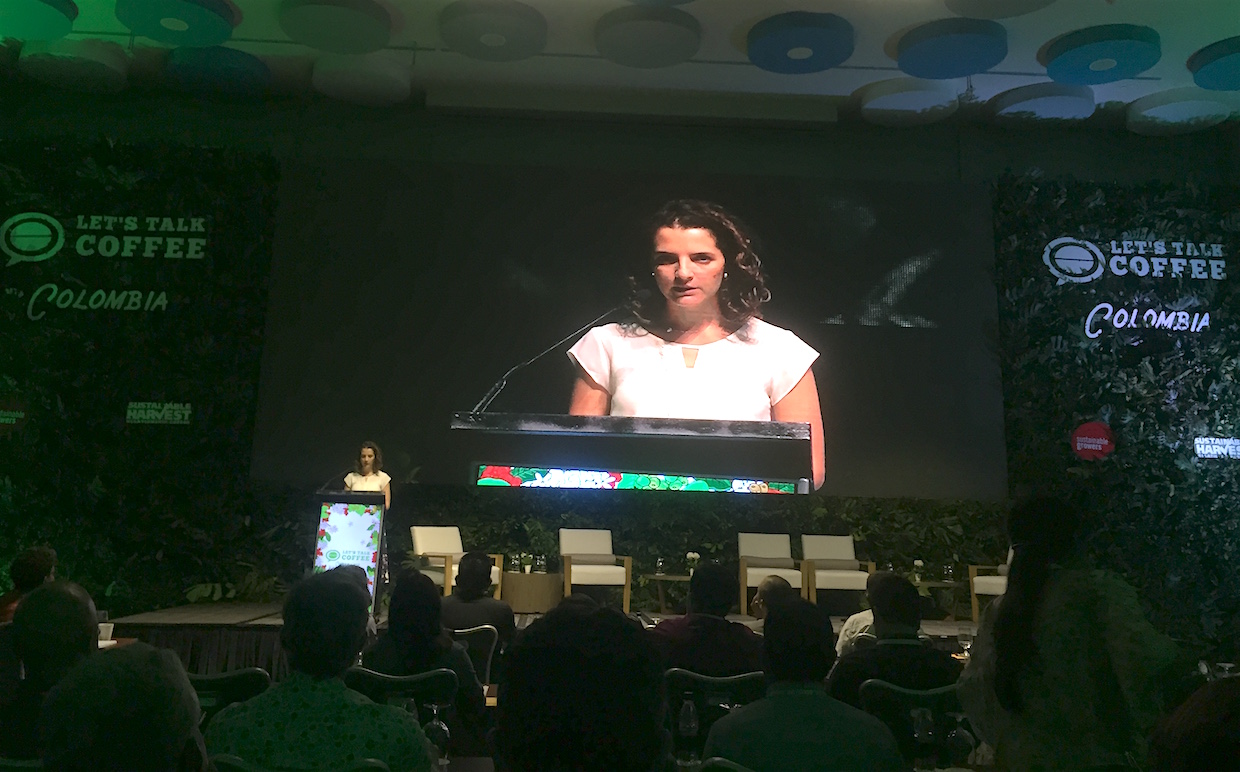
Tatiana Virviescas Mendoza of IDB announcing the program at Let’s Talk Coffee 2018. Daily Coffee News photo by Nick Brown.
Sustainable Harvest and IDB Announce Three-Year Mexico Coffee Revival Project
At its 15th Let’s Talk Coffee global event today in Cartagena, Colombia, green coffee importer Sustainable Harvest announced the launch of a three-year program worth $2 million designed to assist thousands of farmers throughout Southern Mexico.
Five-Year, $36.4 Million Effort to Boost Coffee and Cocoa in Latin America
Called Maximizing Opportunities in Coffee and Cacao in the Americas (MOCCA), the initiative will include farmer training on climate-resilient agronomy, opportunities for access to financing and higher-quality buying markets, and expanded availability to high-quality genetic material for new plantings.
Progreso Launches Innovative Blockchain-Backed Trading Platform Beyco
Progreso Foundation Managing Director Isabel van Bemmelen told Daily Coffee News that the platform has been in development for about a year. Its fundamental purpose, she said, follows the foundation’s driving goal of providing improved market access to coffee producers.
Comment
1 Comment
Comments are closed.



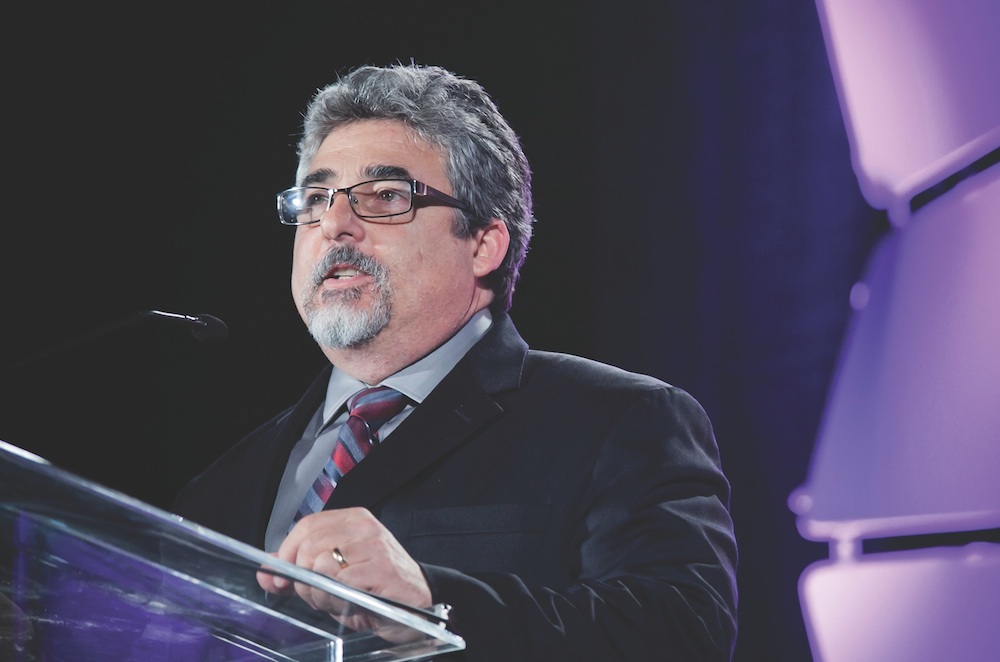




NGOs Might Not Exist if Businesses Were Accountable
Really, now…. is this TRUE? Businesses ARE accountable… to their owners/shareholders, customers, associates along the value chain, and to government and other “collective” entities.
NGO’s are… accountable to WHOM< exactly? How many are personal agenda drivers, pet projects, political tools, tax dodges, thinly veiled promotional arms of business or politics? You seem to take the position that "corporations bad, non-profits good". Painting either group with such a broad brush WILL get you and the rest of us in trouble, and NOT fix the problems "out there". There are plenty of good, honest upright ethical coroporations/businesses, and non-profits. There are ALSO plenty in both categories that are rotten to the core, dishonest, corrupt, and harmful.
Instead of dividing and polarising and setting up false dichotomies, let's take each entity and its work for what THAT one is. NGO's can make a hash of a dicey situation as easily as can corporations/privately held businesses. I've seen plenty of unfair actions with harms included from both groups. And plenty of amazing benefits realised by both as well.
There is already far too much polarisatioin invading our culture. Please don't add to it.